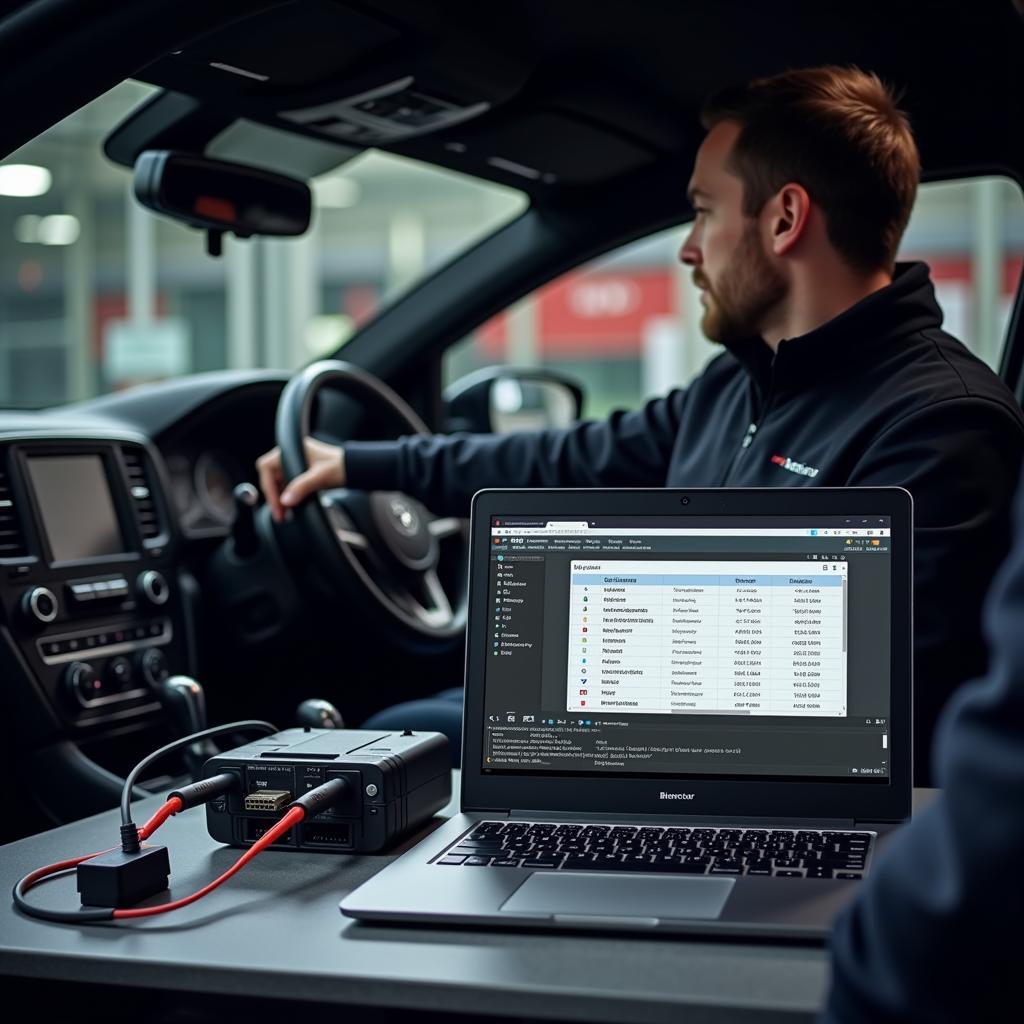Should you restore your car to its stock tune before taking it in for maintenance? This is a question many car owners with modified vehicles ponder. Whether you’re dealing with a simple oil change or a more complex repair, understanding the implications of your car’s tune on maintenance procedures is crucial.
Understanding the Impact of Tuning on Maintenance
Modifications to your car’s engine control unit (ECU), often referred to as “tuning,” can significantly alter various performance parameters. These changes, while potentially boosting horsepower and torque, can also impact how your car responds to routine maintenance and diagnostic procedures. This includes everything from how the engine burns fuel to the transmission shift points. So, Can I Restore My Car To Stock Tune Before Maintenance? The answer depends on several factors.
Why Consider Reverting to Stock Tune?
Reverting to the factory tune can simplify the diagnostic process for technicians. Aftermarket tunes can sometimes mask underlying issues or trigger false error codes, making it harder for mechanics to pinpoint the real problem. Furthermore, some dealerships may refuse to work on modified vehicles or void your warranty if they suspect performance enhancements have caused or contributed to the issue.
When is Reverting Necessary?
- Warranty Claims: If you’re taking your car in for a repair covered under warranty, it’s highly recommended to return it to the stock tune. This avoids any potential disputes with the dealership about the validity of your claim.
- ECU Updates: Dealerships often perform ECU updates during routine maintenance. These updates are designed for the factory tune and might conflict with aftermarket software, potentially leading to performance issues or even damage to the ECU.
- Emissions Testing: In areas with strict emissions regulations, a modified tune might cause your car to fail emissions tests. Returning to the stock tune ensures compliance and avoids potential fines.
- Complex Diagnostics: If your car is experiencing unusual behavior that’s difficult to diagnose, reverting to the factory settings can provide a clean slate for technicians to troubleshoot.
 Returning Car to Stock Tune for Maintenance
Returning Car to Stock Tune for Maintenance
When is Reverting Unnecessary?
- Routine Maintenance: For simple tasks like oil changes, tire rotations, or brake replacements, reverting to the stock tune is usually unnecessary. These procedures aren’t directly affected by engine performance modifications.
- Independent Mechanics: If you’re working with a trusted independent mechanic who is familiar with modified vehicles, they may be able to diagnose and repair issues without requiring a return to the stock tune.
- Performance-Specific Shops: Specialty shops specializing in performance tuning often have the expertise to handle maintenance on modified cars without the need for a stock tune reversion.
How to Restore Your Car to Stock Tune
The process for restoring your car to its original tune varies depending on the method used for tuning. If you used a handheld tuner, simply follow the device’s instructions for restoring the factory settings. If your car was professionally tuned, you’ll need to return to the tuner and have them revert the ECU back to stock.
Can I Tune My Car Back After Maintenance?
Absolutely! Once the maintenance is complete, you can reinstall your preferred tune. However, it’s essential to ensure compatibility with any ECU updates that may have been performed during maintenance. Consult with your tuner if you have any concerns.
Expert Insights
- John Miller, Automotive Engineer: “While not always mandatory, returning to stock tune can save time and money in the long run by simplifying diagnosis and preventing warranty issues.”
- Susan Davis, Certified Mechanic: “A clear communication with your mechanic about your car’s modifications is essential, regardless of whether you revert to stock or not.”
Conclusion
Deciding whether to restore your car to stock tune before maintenance is a crucial decision for modified car owners. While not always required, reverting can simplify diagnostics, prevent warranty issues, and ensure compatibility with ECU updates. Consider the nature of the maintenance, your relationship with your mechanic, and any potential warranty implications when making your decision. For more personalized advice, feel free to reach out to AutoTipPro at +1 (641) 206-8880 or visit our office at 500 N St Mary’s St, San Antonio, TX 78205, United States.
 Mechanic Discussing Car Modifications with Owner
Mechanic Discussing Car Modifications with Owner
FAQ
- Will reverting to the stock tune erase my custom tune? No, reputable tuners typically store a backup of your custom tune, allowing them to easily reinstall it after maintenance.
- Can a dealership detect if my car has been tuned? Yes, dealerships have sophisticated diagnostic tools that can detect traces of aftermarket tuning.
- Is it illegal to drive with a modified tune? It depends on local regulations. Some modifications can violate emissions standards or other legal requirements.
- How much does it cost to have my car returned to the stock tune? The cost varies depending on the tuning method and the shop you choose.
- Can I tune my car myself? Yes, handheld tuners allow for DIY tuning, but it’s crucial to understand the risks involved.
- What are the benefits of a professional tune? Professional tuners can optimize your car’s performance while ensuring safety and reliability.
- What happens if I don’t revert to stock tune before a warranty repair? The dealership could deny your warranty claim if they believe the modification caused the issue.




Leave a Reply